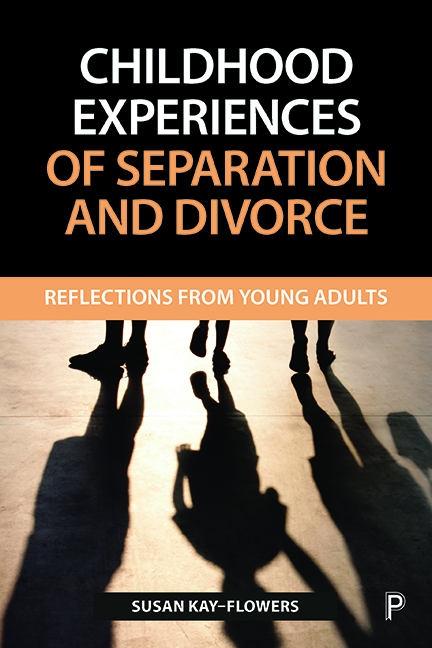Book contents
- Frontmatter
- Dedication
- Contents
- Figures and tables
- Acknowledgements
- One Introduction
- Two What is known about children’s experience of parental separation and divorce?
- Three The research study
- Four Constructing a new framework for understanding children’s accommodation of parental separation
- Five Setting the context for the framework: emotions
- Six Reactions
- Seven Support
- Eight Communication
- Nine Conflict
- Ten Future directions
- References
- Appendices
- Index
Ten - Future directions
Published online by Cambridge University Press: 27 April 2022
- Frontmatter
- Dedication
- Contents
- Figures and tables
- Acknowledgements
- One Introduction
- Two What is known about children’s experience of parental separation and divorce?
- Three The research study
- Four Constructing a new framework for understanding children’s accommodation of parental separation
- Five Setting the context for the framework: emotions
- Six Reactions
- Seven Support
- Eight Communication
- Nine Conflict
- Ten Future directions
- References
- Appendices
- Index
Summary
The aim of the study was to give ‘voice’ to young adults’ childhood experiences of parental separation, ‘voices’ largely absent from the literature to date; this book has been written to ensure that their ‘voices’ are heard. In articulating their ‘voice’, their experiences have been listened to, acknowledged and understood, the framework amplifies those experiences, affecting children's accommodation of parental separation and post-separation changes, presenting them in a readily accessible form.
This final chapter considers how the framework can be used to develop a more nuanced understanding of the ways in which children experience parental separation and accommodate changes over time. Set within the context of what young adults had to say about information that would have been useful to them at the time (Question 19), the chapter explores the value of the framework for practitioners working to support children. Consideration of who might be best placed to support children in schools and how they might do this, involves looking at the role of practitioners, the Personal, Social, Health and Economic (PSHE) curriculum in schools and peer support. The study highlighted issues raised for young adults when parental separation coincided with the move to higher education and so its use by support services in universities is also considered.
When separating, parents make decisions about post-separation arrangements, children are largely powerless and lack agency in this process, and so the chapter goes on to consider the value of the framework to parents and those working with them in encouraging a deeper understanding of how their actions, responses and decisions can promote a higher level of accommodation for their children. The chapter starts by considering what children saw as their support needs.
Support needs
Chapter Seven (Support) showed that most respondents with a high level of accommodation identified their parent(s) as sources of support and were able to talk to them about the separation. They found this support network sufficient and did not want the opportunity to speak to someone outside the family about the separation, although two respondents (11, 31), aged 9–12 at the time, who identified very high levels of anxiety leading to health issues, panic attacks (11) and an eating disorder and suicidal thoughts (31), thought that they may have benefited from such an opportunity.
- Type
- Chapter
- Information
- Childhood Experiences of Separation and DivorceReflections from Young Adults, pp. 167 - 180Publisher: Bristol University PressPrint publication year: 2019



